Thirteen doable ideas for cities from first ever Urban Innovation Exchange
Walter Wasacz |
Monday, October 13, 2014
The first ever Urban Innovation Exchange (UIXDET) convened in Detroit last month, and people from cities around the country traded ideas for community transformation, telling localized and personalized stories of success and failure, hard work, and creativity.
Each morning for three days, chairs filled with bodies, rooms became incubators for ideas, and inspiration flowed. In truth, it overflowed beyond the walls of venues and into the streets of Detroit in the form of site visits and overlapping Detroit Design Festival and
DLECTRICITY events.
Day 1 - Art of Place (Museum of Contemporary Art Detroit)
UIXDET began with an introduction by UIX editorial director Claire Nelson and opening thoughts by Katy Locker, Detroit program director for the Knight Foundation. Locker talked about Knight's $5 million Cities Challenge Grant, which begins taking applications Oct. 1 (through Nov. 14). Her message to applicants? "Keep it simple; we want to keep it open for everyone."
Idea: Use the city as a gallery
Joan Vorderbruggen of Minneapolis talked about her projects Artists in Storefronts and
Made Here, which have turned parts of a South Minneapolis neighborhood into "an urban art gallery." She said her group decorated a pedestrian bridge, did walking tours every Saturday, and turned the community into a "party zone" by making it visually exciting. Made Here was recently awarded a $48,000 grant by the McKnight Foundation. "All of that money will go to artists," she said.
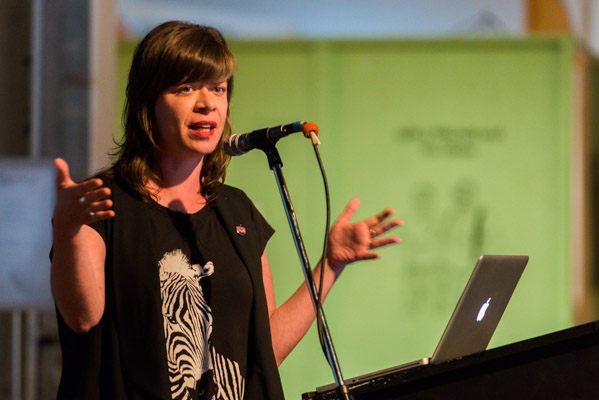 Joan Vorderbruggen
Erik Howard presented about The Alley Project
Joan Vorderbruggen
Erik Howard presented about The Alley Project (TAP) Gallery, which he describes as a "sustainable cultural community project and walking gallery that helps transform neighborhood through art and engagement." Howard said TAP has grown "one garage at a time" and that neighborhood youth in southwest Detroit use the garages for expression through art, "becoming producers instead of consumers of media."
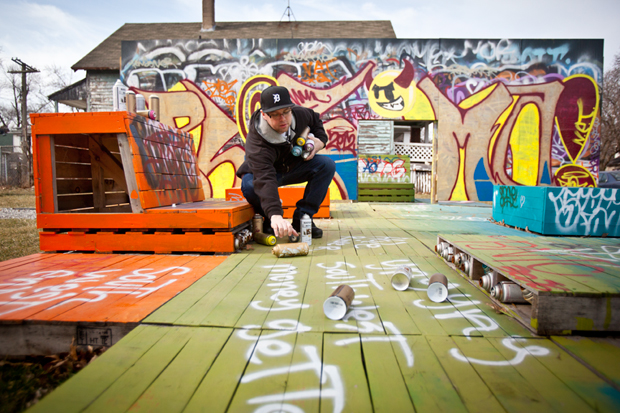 Idea: Use places to bring people together
Sara Blumenstein presented about the Garfield Night Market
Idea: Use places to bring people together
Sara Blumenstein presented about the Garfield Night Market in Pittsburgh, an effort to activate a struggling neighborhood with a monthly night of food and fun for the entire family. The group behind the project even conducts its own census with tracking tools that measure development trends in the neighborhood. She also talked about the related
Tiny Houses project, an attempt to fill in vacant lots in the Garfield community with affordable housing.
Two great ideas from Cleveland were delivered by separate presenters. David Jurca talked about Pop Up City, a series of projects in part inspired by research done for the
Shrinking Cities exhibition. One of the best ideas was how to take advantage of wintry weather conditions by creating "coldscapes" to improve livability in northern cities. Greg Peckham of Cleveland's
LAND Studio talked about connecting multiple neighborhoods - including the Detroit Shoreway along Lake Erie - with greenways, bike transit advocacy and public art.
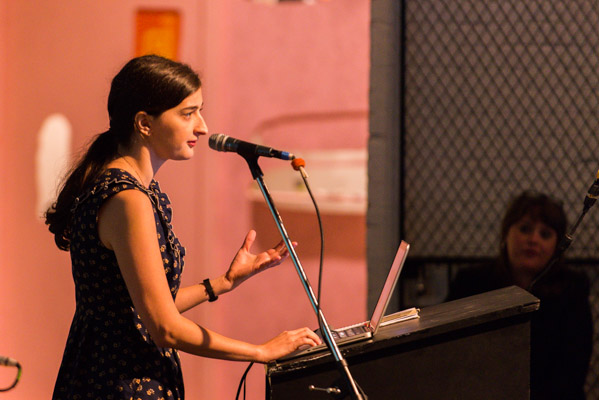 Sara Blumenstein
Idea: Advertise your assets
More innovative work coming from Ohio was presented by Megan Deal of Cincinnati, who talked about CoSign
Sara Blumenstein
Idea: Advertise your assets
More innovative work coming from Ohio was presented by Megan Deal of Cincinnati, who talked about CoSign, a project that uses the city's commercial visual heritage (the
American Sign Museum is in Cincinnati) to increase neighborhood vibrancy via creative signage.
Idea: Keep it inclusive
Also presenting on Day 1 was Ryan Myers-Johnson of
Sidewalk Festival for the Arts. She said her goal is to bring the arts to Detroit neighborhoods, breaking up what she sees as the "exclusivity of the performance art scene." Amy Kaherl of
Detroit SOUP - which delivers micro-grants for creative projects in neighborhoods across the city - and Sebastian Jackson of Detroit's
Social Club Grooming Company (which combines hair recycling with efforts to create racial equity through haircutting and conversational storytelling) presented; as did Hunter Franks,
League of Creative Interventionists in San Francisco; and Eve Picker,
CityLab Pittsburgh &
smallchange.com - a real estate crowdfunding platform that uses small ideas to big advantage.
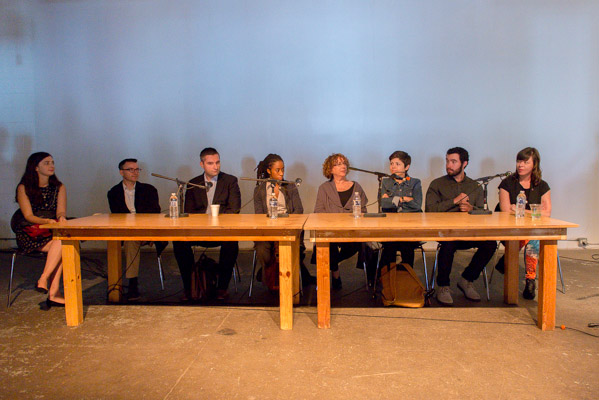 Art of Place panel
After the presentations, a group paid site visits to Hamtramck and Banglatown neighborhoods
Art of Place panel
After the presentations, a group paid site visits to Hamtramck and Banglatown neighborhoods, where projects like Power House, Play House, Write-A-House and Popps Packing are helping change community life through social art and design.
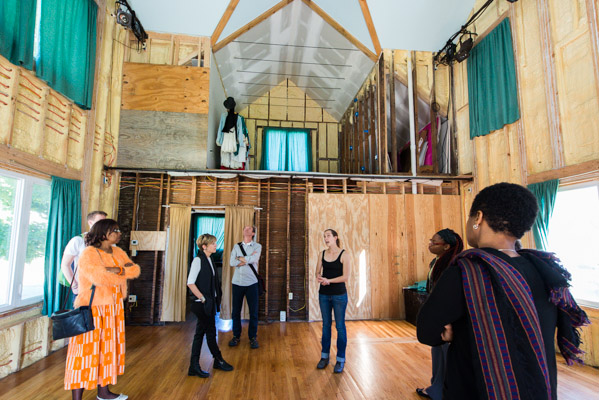 The Hinterlands' Play House
Day 2 - The Future of Food (Detroit Mercantile)
Day two began with a welcoming wakeup call -- "We are coming out of a 50-year coma" when it comes to what we eat -- by Detroit Eastern Market Corporation
The Hinterlands' Play House
Day 2 - The Future of Food (Detroit Mercantile)
Day two began with a welcoming wakeup call -- "We are coming out of a 50-year coma" when it comes to what we eat -- by Detroit Eastern Market Corporation's president Dan Carmody, who also plugged
Eastern Market After Dark taking place later that evening.
Idea: Reuse and re-build, don't re-invent
Kim Bartmann of Tiny Diner in Minneapolis talked about how the restaurant and farm is a "
small place with big ideas," that works on "rebuilding old, not having to invent new" and partners with a permaculture group in the city. She said the business added solar panels and created an ecological garden though was required to go through a difficult re-zoning and permitting process with the city.
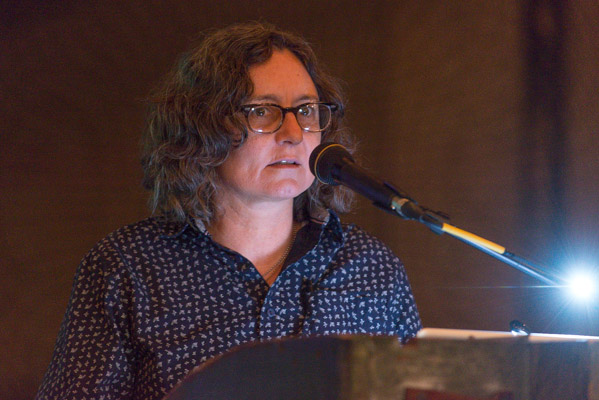 Kim Bartman
Idea: Farm the city -- indoors and out
Anthony Hatinger of CDC Farm & Fishery
Kim Bartman
Idea: Farm the city -- indoors and out
Anthony Hatinger of CDC Farm & Fishery said the group acquired a former liquor store at the corner of Second and Philadelphia on Detroit's near west side and converted it into a farm for raising tilapia. Nutrients from the water used in the tanks is then transferred to a garden, where various greens are grown. "We produce food, jobs, and hope," Hatinger said.
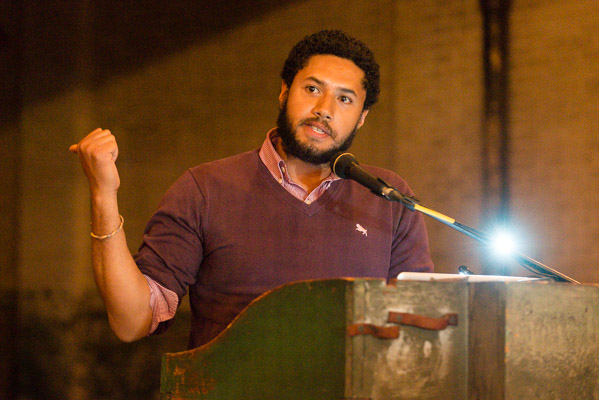 Anthony Hatinger
Dwayne Wharton of Philadelphia's Food Trust said the best way to know the future "is to create it." He said his group works at allowing everyone to have access to healthy, affordable food choices. "The zip code matters more than genetic code. People die earlier where diet is poor, Wharton said. Keymah Durden, of Cleveland's Rid-All Green Partnership
Anthony Hatinger
Dwayne Wharton of Philadelphia's Food Trust said the best way to know the future "is to create it." He said his group works at allowing everyone to have access to healthy, affordable food choices. "The zip code matters more than genetic code. People die earlier where diet is poor, Wharton said. Keymah Durden, of Cleveland's Rid-All Green Partnership, said his group is all about urban farming, composting, and aquaponics. "Environmental and social justice is the largest movement in human history," he said. "We are about 'original state' agriculture, growing healthy children to become the urban farmers of tomorrow."
Idea: Keep it fresh, always
Peter Dalinowski, of Hamtramck's revolver talked about his concept to have rotating chefs each weekend at his restaurant, located in a diverse community with ethnic Bangladeshi, Yemeni and Polish communities. "We are not a pop up," he said, "We are a permanent space. We run the front and the chefs run the back. There is no hierarchy and respect extends to everyone."
Idea: Do the things that don't cost money, like building relationships
Devita Davison talked about two projects, FoodLab Detroit and
Detroit Kitchen Connect. "We are turning church kitchens into incubators," Davison said. Of Foodlab Detroit, she said its mission is to "cultivate, connect, catalyze," helping food entrepreneurs get started and build relationships.
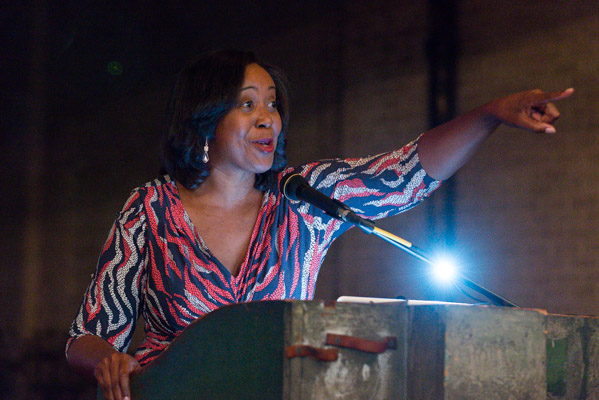 Devita Davison
Brittany Sanders of the Detroit Food Academy
Devita Davison
Brittany Sanders of the Detroit Food Academy said her group helps Detroit high school students develop into leadership roles as social entrepreneurs. Bobby Fry, from Pittsburgh's
Food Revolution Cooking Club, said it is important to "use local things, empower people, make beautiful food, engage the community, keep them excited." Fry also advised food people to "build relationships and pay attention to things that don't cost money."
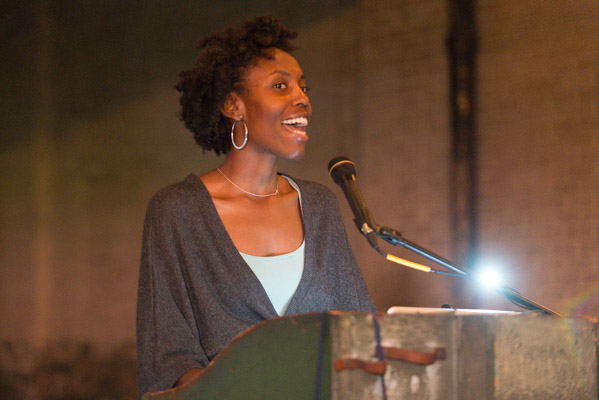 Brittany Sanders
Sara Blumenstein of the Pittsburgh Canning Exchange
Brittany Sanders
Sara Blumenstein of the Pittsburgh Canning Exchange talked about canning swaps and parties that build community. "Nothing makes me happier than seeing a hipster and a grandmother sharing recipes," she said.
The site visit was to McClure's Pickles, on St. Aubin near the Hamtramck border, and to the
Michigan Urban Farming Initiative in the North End neighborhood.
Day 3 - The Maker Movement (Passenger)
The final day of the UIX forums was held at Passenger, the newish live/work space for resident artists in rapidly redeveloping Capitol Park.
Idea: There's no such thing as a skills gap, but there is a values gap
Jen Guarino of Detroit's Shinola and the
Makers Coalition of Minneapolis addressed the so-called skills gap in American manufacturing by saying there isn't one, but "there is a values gap." She said "now is the time for a wake up call in manufacturing: we have to look at skilled labor as an asset not as a cost. Let's be passionate about what we do. Let's be passionate about the people who do what we do."
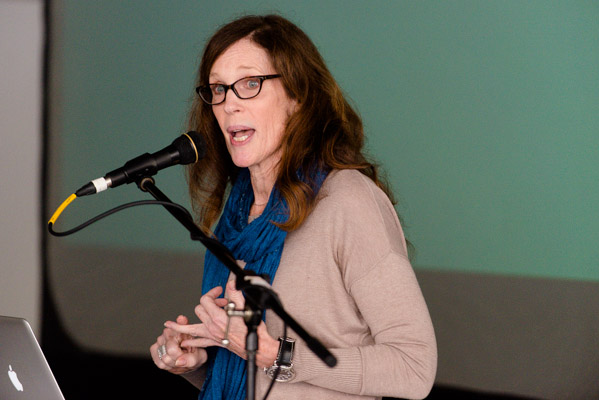 Jen Guarino
Idea: Build spaces where kids can tinker
Jeff Sturges of Detroit's Mt. Elliott Makerspace
Jen Guarino
Idea: Build spaces where kids can tinker
Jeff Sturges of Detroit's Mt. Elliott Makerspace said that his goal is to "expose people to as many things as possible at an early age." As a kid, he said, "I had spaces to tinker and blow things up." Sturges said the areas of concentration for the makerspace are about fundamentals: communication, wearables, food and wellness.
Idea: Embrace the skills of locals
Matt Anthony of Cincinnati's First Batch and
Cincinnati Made talked about creating an accelerator for small batch manufacturing, facilitating connections, encouraging idea development, showing that impact can be made with innovative products.
Sara Aldridge and JeanMarie Morrish of Our/Detroit, a vodka distillery in southwest Detroit, said their business is women-owned and operated, uses ingredients sourced within five miles of their location and "has great local partners, like McClure's Pickles."
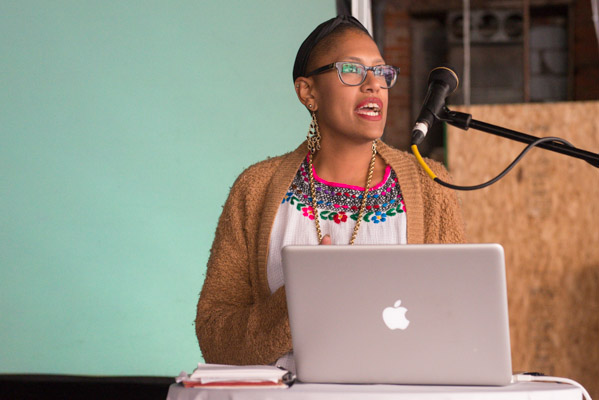 Sara Aldridge
Idea: Don't get sold a brand, build your own
Michael Evans of LOVELAND Technologies in Detroit called his group "data geeks" who, with the help of Motor City Mapping, "surveyed every single parcel" in the city last winter. He advised people to "learn a hard skill and find a way to communicate it."
Clement Brown Jr., of the FAME SHOP
Sara Aldridge
Idea: Don't get sold a brand, build your own
Michael Evans of LOVELAND Technologies in Detroit called his group "data geeks" who, with the help of Motor City Mapping, "surveyed every single parcel" in the city last winter. He advised people to "learn a hard skill and find a way to communicate it."
Clement Brown Jr., of the FAME SHOP on Joy Road on Detroit's west side, told a moving story of a boy whose grandparents bought him an outfit, including a $200 pair of gym shoes, only to be be robbed, shot and killed over the items. Brown, who said he grew up in an abusive home, began to make T-shirts when he was a teenager to "separate himself from what was going on out on the street." He said his goal was to "help kids appreciate their own personal brand not commercial brands."
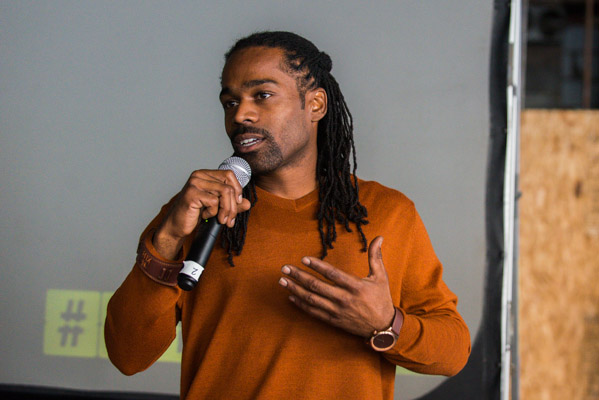 Clement "Fame" Brown, Jr.
Idea: Chaos isn't a pit, chaos is a ladder
The morning's last speaker was John Fetterman
Clement "Fame" Brown, Jr.
Idea: Chaos isn't a pit, chaos is a ladder
The morning's last speaker was John Fetterman, mayor of Braddock, a small town outside of Pittsburgh. Fetterman, who has done national media interviews about the fall and rise of Braddock, introduced himself bluntly by saying: "my town was more fucked up than yours ever was." He described a city, once known for its steel works, that had lost 90 percent of its population over a 50 year period. Fetterman spoke with passion, color and humor, paraphrasing dialogue from HBO's 'Game of Thrones' ("Chaos isn't a pit, chaos is a ladder"), and making a pro football reference to the Lions ("But the Steelers are better," he said with a laugh).
He turned serious when he said Braddock had gone five years without a homicide until late this summer ("Safety is the number one issue for cities," he said) and said the city has set up a free store to address basic needs of its residents.
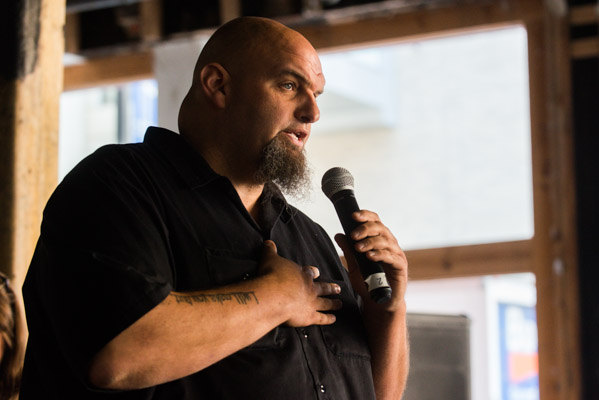 John Fetterman
After a panel discussion moderated by Issue Media Group's director of content Amy Elliott Bragg, the group left by bus to see co-working and maker spaces at Ponyride.
Some people came back to Passenger to hear Knight Foundation
John Fetterman
After a panel discussion moderated by Issue Media Group's director of content Amy Elliott Bragg, the group left by bus to see co-working and maker spaces at Ponyride.
Some people came back to Passenger to hear Knight Foundation president Alberto Ibargüen and vice president for community and national initiatives Carol Coletta in conversation about what cities need to do to accelerate talent. There was a
Creative Exchange happy hour right after, and design festival crawls and Dlectricity installations to attend even later.
The day and night would have to come to an end, though it's likely there were many who did not want it to. It was a special day, and the finish of a most special week, in Detroit.
Looking for more inspiration from urban innovators whose small-scale projects are having big impacts on cities? Visit Urban Innovation Exchange. (Don't forget to like UIX on Facebook and follow it on Twitter, too!)
---
Walter Wasacz is former managing editor for Model D.
All photos by Doug Coombe.